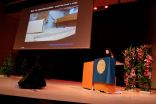Hummingbird's hover surprisingly easy to hack
2014-12-08
(Press-News.org) Hummingbirds' remarkable ability to hover in place is highly contingent on the tiny bird having a completely stationary visual field, according to University of British Columbia research published in the Proceedings of the National Academy of Sciences.
UBC zoologists Benjamin Goller and Douglas Altshuler projected moving spiral and striped patterns in front of free-flying hummingbirds attempting to feed from a stationary feeder.
Even minimal background pattern motion caused the hummingbirds to lose positional stability and drift. Giving the birds time to get used to the stimuli didn't eliminate the disruption. Projecting a combination of moving and stationary patterns in front of the birds didn't help either, although birds were able to regain some stability.
Editors note: Photos and video of the hummingbird experiment available at: http://tinyurl.com/q6yaxm5
"We were very surprised to see how strong and lasting the disruption was -- birds with hovering and feeding abilities fine-tuned to the millimetre were off the mark by a centimetre," said Goller. "We think the hummingbird's brain is so precisely wired to process movement in its field of vision that it gets overwhelmed by even small stimuli during hovering."
It's the first time researchers have directly measured the impact of moving visual patterns on free flight in birds.
VIDEO:
A tube containing sugar water is placed in front of an LCD computer monitor with a looming black-and-white spiral pattern (clockwise rotation). The feeding bird oscillates back and forth at...
Click here for more information.
"Our brains interpret visual motion based on our current circumstances," says Altshuler. "We react very differently to sideways movement in a parked car than while driving. Now we want to investigate how birds use vision during transitions from mode to mode, for example as they move from hovering to forward flight."
INFORMATION:
Benjamin Goller
Graduate Student
UBC Zoology
goller@zoology.ubc.ca
Douglas Altshuler
Associate Professor
UBC Zoology
doug@zoology.ubc.ca
+1-604-827-5361
ELSE PRESS RELEASES FROM THIS DATE:
2014-12-08
A new advance in biomedical research at the University of Leicester could have potential in the future to assist with tackling diseases and conditions associated with ageing - as well as in treating cancer.
The research, which has shown promise in clinical samples, has been published in the prestigious scientific journal, Cell Death and Disease.
The group of scientists coordinated by Dr Salvador Macip from the Mechanisms of Cancer and Ageing Lab and the Department of Biochemistry of the University of Leicester carried out the study to find new ways of identifying old ...
2014-12-08
You don't have to be a jerk to come up with fresh and original ideas, but sometimes being disagreeable is just what's needed to sell your brainchild successfully to others. However, difficult or irritating people should be aware of the social context in which they are presenting their ideas. A pushy strategy will not always be equally successful, warn Samuel Hunter of Pennsylvania State University and Lily Cushenbery of Stony Brook University in the US, in an article in Springer's Journal of Business and Psychology.
People are often labelled as jerks if they are disagreeable ...
2014-12-08
CAMBRIDGE, MA -- MIT chemists have devised a new way to wirelessly detect hazardous gases and environmental pollutants, using a simple sensor that can be read by a smartphone.
These inexpensive sensors could be widely deployed, making it easier to monitor public spaces or detect food spoilage in warehouses. Using this system, the researchers have demonstrated that they can detect gaseous ammonia, hydrogen peroxide, and cyclohexanone, among other gases.
"The beauty of these sensors is that they are really cheap. You put them up, they sit there, and then you come around ...
2014-12-08
Researchers have long wondered if there is an upper limit to our capacity to store memories and how we manage to remember so many events without mixing up events that are very similar.
To explore this issue, researchers at the Norwegian University of Science and Technology's (NTNU) Kavli Institute for Systems Neuroscience and Centre for Neural Computation and colleagues from the Czech Republic and Italy tested the ability of rats to remember a number of distinct but similar locations. Their findings are published in the 8 December edition of the Proceedings of the National ...
2014-12-08
Technology that can map out the genes at work in a snake or lizard's mouth has, in many cases, changed the way scientists define an animal as venomous. If oral glands show expression of some of the 20 gene families associated with "venom toxins," that species gets the venomous label.
But, a new study from The University of Texas at Arlington challenges that practice, while also developing a new model for how snake venoms came to be. The work, which is being published in the journal Molecular Biology and Evolution, is based on a painstaking analysis comparing groups of ...
2014-12-08
(BOSTON and CAMBRIDGE, Massachusetts) - One of the reasons cancer is so deadly is that it can evade attack from the body's immune system, which allows tumors to flourish and spread. Scientists can try to induce the immune system, known as immunotherapy, to go into attack mode to fight cancer and to build long lasting immune resistance to cancer cells. Now, researchers at the Wyss Institute for Biologically Inspired Engineering and Harvard's School of Engineering and Applied Sciences (SEAS) show a non-surgical injection of programmable biomaterial that spontaneously assembles ...
2014-12-08
BUFFALO, N.Y. - A new study has shown that smoking can inhibit the success of treatment for alcohol abuse, putting people who are addicted to both tobacco and alcohol in a double bind.
According to findings by the University at Buffalo Research Institute on Addictions (RIA), clients who smoke have shorter stays in alcohol treatment programs than non-smokers and may have poorer treatment outcomes than non-smokers.
Kimberly Walitzer, PhD, deputy director and senior research scientist at RIA, led the study, which analyzed more than 21,000 adult treatment seekers from ...
2014-12-08
PROVIDENCE, R.I. - Some infections after prostate biopsy due to drug-resistant Escherichia coli can be thwarted by simple rectal swab cultures prior to the procedure. The cultures test for antibiotic-resistant E. coli, and the findings are used to direct the selection of antimicrobial prophylaxis used for the procedure, according to Rhode Island Hospital researchers. The study was recently published in Urology.
For patients undergoing transrectal ultrasound (TRUS)-guided biopsies, Ciprofloxacin may not be the best prophylactic option to use for patients colonized with ...
2014-12-08
NASA's Terra and Aqua satellites flew over Typhoon Hagupit from Dec. 6 through Dec. 8 and the MODIS instrument that flies aboard both satellites provided images of the storm as it moved through the country.
The Moderate Resolution Imaging Spectroradiometer or MODIS instrument aboard NASA's Aqua satellite caught a picture of Hagupit on Dec. 6 before it made landfall. On Dec. 7, the MODIS instrument aboard NASA's Terra satellite took an image of the storm as it was making landfall in the eastern Philippines.
On Dec. 8 at 04:50 UTC (Dec. 7 at 11:50 p.m. EST) when NASA's ...
2014-12-08
Scientists at the Medical College of Wisconsin (MCW) have discovered a link between sleep loss and cell injury. Results of a new study find sleep deprivation causes the damage to cells, especially in the liver, lung, and small intestine. Recovery sleep following deprivation heals the damage.
The findings are published in the December issue of Sleep, a joint publication of the Sleep Research Society and the American Academy of Sleep Medicine. The lead author is Carol Everson, Ph.D., professor of neurology, cell biology, neurobiology and anatomy at MCW. Co-authors are Christopher ...
LAST 30 PRESS RELEASES:
[Press-News.org] Hummingbird's hover surprisingly easy to hack






